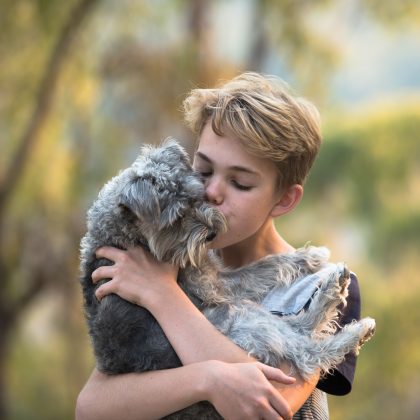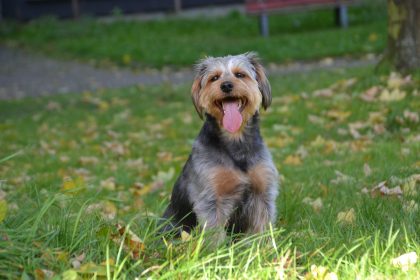The benefits of children and dogs growing up together are immense and the experience offers many positive aspects with regards to a child’s physical and psychological development. Introducing a dog to your family is not to be taken lightly and a lot of preparation and research is required beforehand. Unfortunately there are many rescue centres filled with unwanted dogs. Choosing the right dog for your family is essential, as is good training, care and attention.

To ensure you make the right choice of dog it is important to research the characteristics common to different breeds. Many pedigree dogs are susceptible to inherent genetic defects, for this reason it is important to check out the dogs heritage in order to identify whether the parents of a puppy has been tested for genetic defects such as hip dysplasia. You could research the best DNA testing brand by looking at https://www.certapet.com/dog-dna-test-brands/. This will help you avoid potentially expensive veterinary bills as well as ensure that your new dog will live a long and healthy life, as a great companion for your child.
Here are some of the fantastic benefits of dogs and children growing up together.
Encourages responsibility
Having a pet helps a child develop a sense of responsibility and empathy. Dogs are fantastic for this skill as they give so much back in return. Children will learn that to keep a dog healthy it needs food. Water, exercise and lots of attention. As the dog relies on human intervention a child will develop compassion and a sense of self esteem. Your child is likely to develop a lovely caring nature, at least when it comes to their pet. Often children are greeted at the door by their dog on return from school and they often turn to their pet when feeling troubled. A mutual relationship develops.
Companionship
Having a pet, especially a dog, gives constant companionship. Childhood is fraught with challenges and life lessons, a dog is a constant friend to a child and they make great listeners! Children often turn to their dog when they feel sad and the dog offers unconditional support in abundance. Stroking a pet has been proven to lower stress and is relaxing. Children with learning issues such as autism, often respond well to having a dog. Walking a dog can often help to lower anxiety in children as they feel confident accessing new places and environments with their furry friend.
Increases activity levels
Dogs need exercise to keep healthy, a little like children! Having a dog will encourage your child to lead a more active lifestyle. Dogs will ask for walks and are very hard to resist, despite the attraction of their PS4! Even a short walk everyday is beneficial to a child, being in the outdoors is great for enhancing mood, increasing cardiovascular function and the vitamin D derived from sunshine is invaluable.
Increases immunity
OK, so it may be difficult to keep an immaculate house when there is a dog around, however all those muddy paws, hair and dander is excellent for increasing a child’s immunity! Research has shown that the immunity of a baby in it’s first year can be boosted by a dog around and there is also some evidence to show that the incidence of allergies may decrease, although this isn’t conclusive. In fact many people are allergic to dogs and cats, so it’s essential to check your family isn’t affected prior to introducing a dog to your family.
As described above there are so many benefits to owning a dog. If as a family you have thought carefully and made the decision to introduce a new family pet to your home, how do you ensure the dog you choose is right for your family. All puppies are cute and it’s tempting to take on the first cute puppy you come across, however puppies grow! Research the breed you choose very carefully to see if it fits into your lifestyle.
The following tips will help.
Puppy, adult, male of female?

You have so many decisions to make! Take time to carefully research the benefits of homing a puppy over an adult and vise versa. Also consider whether a male dog or female dog would fit best into your home, taking into account the cost of spaying.
If you adopt an adult dog you will have the added benefit that it has passed the troublesome, time consuming puppy stage. Puppies are cute, but they need lots of attention, they have endless energy as a rule and they have a tendency to chew. You will also have the task of toilet training, which can either be a breeze or takes time. There are lots of adult dogs currently languishing in rescue centers desperate for a new home. There could be the perfect dog just waiting for you.The negatives to adopting an adult dog are that they have a past. It is difficult to know what life experiences the dog has had, meaning that it could be potentially unpredictable when faced with certain situations. A good rescue center will have carefully vetted the dog for it’s suitability to be housed with children. Many dogs aren’t suitable for young children who have a tendency to be unpredictable. Habits formed in an adult dog will be hard to change and they may need time and understanding when adjusting to a new environment.
Puppies are fun, cute and funny. They also have an insurmountable amount of energy. If you are house proud don’t re-home a puppy unless you can quickly adapt to puddles on the floor and chewed furniture! The benefits of owning a puppy are that they are new to the world, ready to be trained and integrate into your family life. They don’t have a past or any experiences likely to make them nervous or unpredictable. They are very much a blank canvas. Children adore puppies, but the biting and chewing stage can be problematic. Owning a puppy will allow your child and dog to grow up together, but will need a lot of input, especially in the area of training.
Whether you choose a male of female is very much down to personal preference. Research the breed you are interested in as to how the different genders react. Advice should be sought from veterinary surgeons regarding neutering.
Which breed of dog?

Different breeds are suitable for different family situations. If you are an active family who love walking in the great outdoors and active breed would suit. A more sedentary family may prefer a breed which likes shorter walks such as a greyhound.
One of the main considerations when choosing a breed of dog is size. How large a dog would you prefer and how much space do you have at home? All puppies are tiny and cute – but they grow!
Ensure you are aware of any health issues common to the breed of dog you are considering. Pedigree breeds are prone to certain hereditary conditions as a result of intensive breeding. Ensure there are no defects in the bloodline.
Different breeds have certain personality traits. Some breeds are stubborn and difficult to train, others are very biddable and want to please. Of course there is no guarantee of the type of personality your puppy will have, but choosing a breed with a personality you prefer will help the prospect of choosing a puppy with positive personality traits more likely.
Another option is to choose a cross breed dog, these are less likely to suffer from hereditary conditions and tend to be more robust and healthy. The downside to a cross breed is that it will be hard to predict what the adult will look like in terms of size.
There’s a lot to think about, so ensure you research your choice of dog thoroughly. The addition of a dog which fits your family will enhance everyone’s quality of life, especially your child’s.
